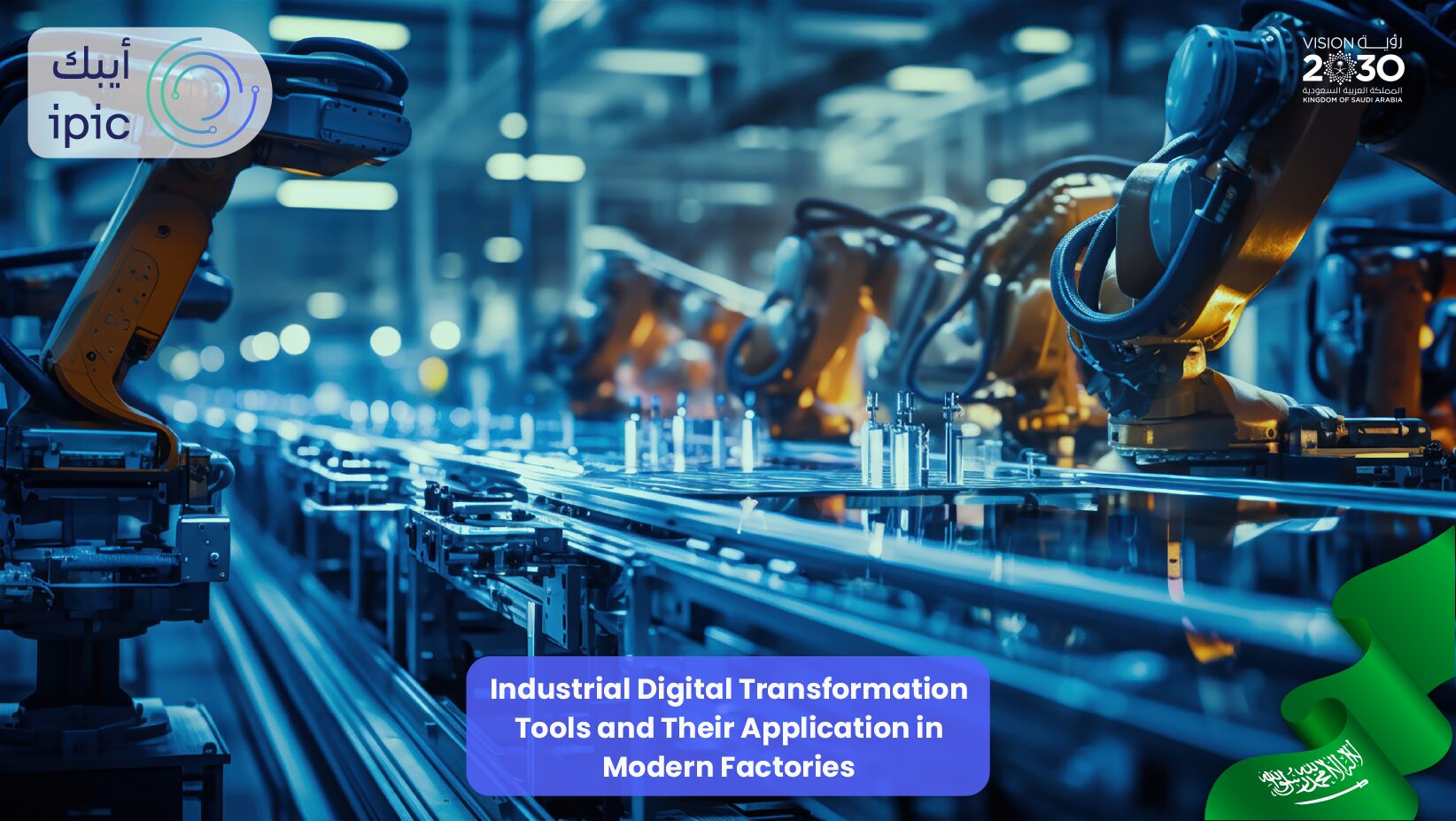Industrial Digital Transformation Tools and Their Application in Modern Factories
Introduction
Digital transformation in the industrial sector is no longer optional; it has become a necessity to keep up with rapid technological advancements and maintain competitiveness in global markets. This transformation aims to enhance operational efficiency, improve product quality, and accelerate decision-making by adopting integrated digital tools.
In this article, we explore the key tools of industrial digital transformation, their practical applications, and the role of specialized consulting companies like IPIC in supporting this transformation.
1. Industrial Internet of Things (IIoT)
Description: A network of connected devices and equipment that collect and analyze data.
Benefit: Real-time equipment performance monitoring and predictive maintenance.
Application: Installing sensors on machines and linking them to a data analysis platform to track operations and plan maintenance.
2. Manufacturing Execution Systems (MES)
Description: Specialized systems for managing and tracking production processes within a factory.
Benefit: Enhancing operational efficiency through real-time production tracking.
Application: Integrating MES with ERP systems and production lines to provide accurate data on manufacturing stages and product quality.
3. Cloud Computing
Description: Utilizing computing resources over the internet instead of local servers.
Benefit: Improved data accessibility, reduced operational costs, and enhanced security and flexibility.
Application: Adopting cloud solutions for maintenance, production, and supply chain management.
4. Advanced Analytics and Artificial Intelligence (AI & Analytics)
Description: AI-driven analytics systems to extract patterns and make smart decisions.
Benefit: Improved production and sales forecasting, reduced waste and losses.
Application: Analyzing operational data to detect potential failures and optimize energy consumption in factories.
5. Digital Twin
Description: A virtual model that accurately simulates equipment or production lines.
Benefit: Testing and modifying operational processes without affecting actual production.
Application: Using digital twin models to simulate production improvements before implementation.
6. Predictive Maintenance
Description: Data-driven techniques to anticipate maintenance needs in advance.
Benefit: Reducing unexpected breakdowns and extending equipment lifespan.
Application: Connecting sensor data to advanced analytics platforms to generate alerts when maintenance is needed.
7. Enterprise Resource Planning (ERP) Systems
Description: Integrated systems that connect all factory departments, such as inventory, procurement, HR, and finance.
Benefit: Enhancing internal coordination and improving strategic decision-making based on accurate data.
Application: Integrating ERP with MES and IIoT to obtain a comprehensive view of operational performance.
Steps to Implement Digital Transformation Tools in Factories
1. Assessing Digital Readiness
- ✔ Analyzing the current state using tools like SIRI to identify digital gaps.
- ✔ Prioritizing based on expected impact and return on investment.
2. Developing a Digital Transformation Roadmap
- ✔ Starting with pilot projects to test technology before full-scale deployment.
- ✔ Selecting appropriate digital tools based on industrial goals (e.g., MES for monitoring, AI for analysis).
3. Building Digital Infrastructure
- ✔ Developing internal communication networks and ensuring system integration.
- ✔ Adopting cloud solutions and upgrading sensors and connected equipment.
4. Training Employees and Enhancing Digital Competency
- ✔ Training employees to effectively use new digital tools.
- ✔ Promoting a culture of innovation and collaboration among operational teams.
5. Measuring Performance and Continuous Improvement
- ✔ Tracking performance using KPIs to assess digital transformation success.
- ✔ Regularly reviewing plans and adjusting them as needed to achieve set objectives.
The Role of IPIC in Supporting Industrial Digital Transformation
IPIC (Intelligent Performance for Industrial Consultation) offers comprehensive solutions to assist factories in their digital transformation journey. Its services include:
- Digital Consulting: Assessing factory readiness and providing tailored digital transformation solutions.
- Smart Technology Implementation: Supporting factories in adopting technologies like IIoT, MES, and AI.
- Operational Process Optimization: Enhancing production efficiency through integrated digital solutions.
- Developing Transformation Strategies: Creating a comprehensive roadmap to ensure a successful and sustainable digital transformation.
Conclusion
Digital transformation in factories is not just about introducing new technologies; it is a strategic approach aimed at enhancing operational efficiency and improving product quality. By adopting the right digital tools and leveraging specialized expertise such as IPIC, factories can reduce costs, increase productivity, and strengthen their competitiveness in global markets.
Has your factory started this journey? Digital transformation begins with a step, and the first step is knowledge.



